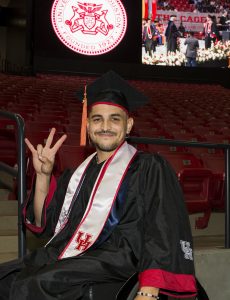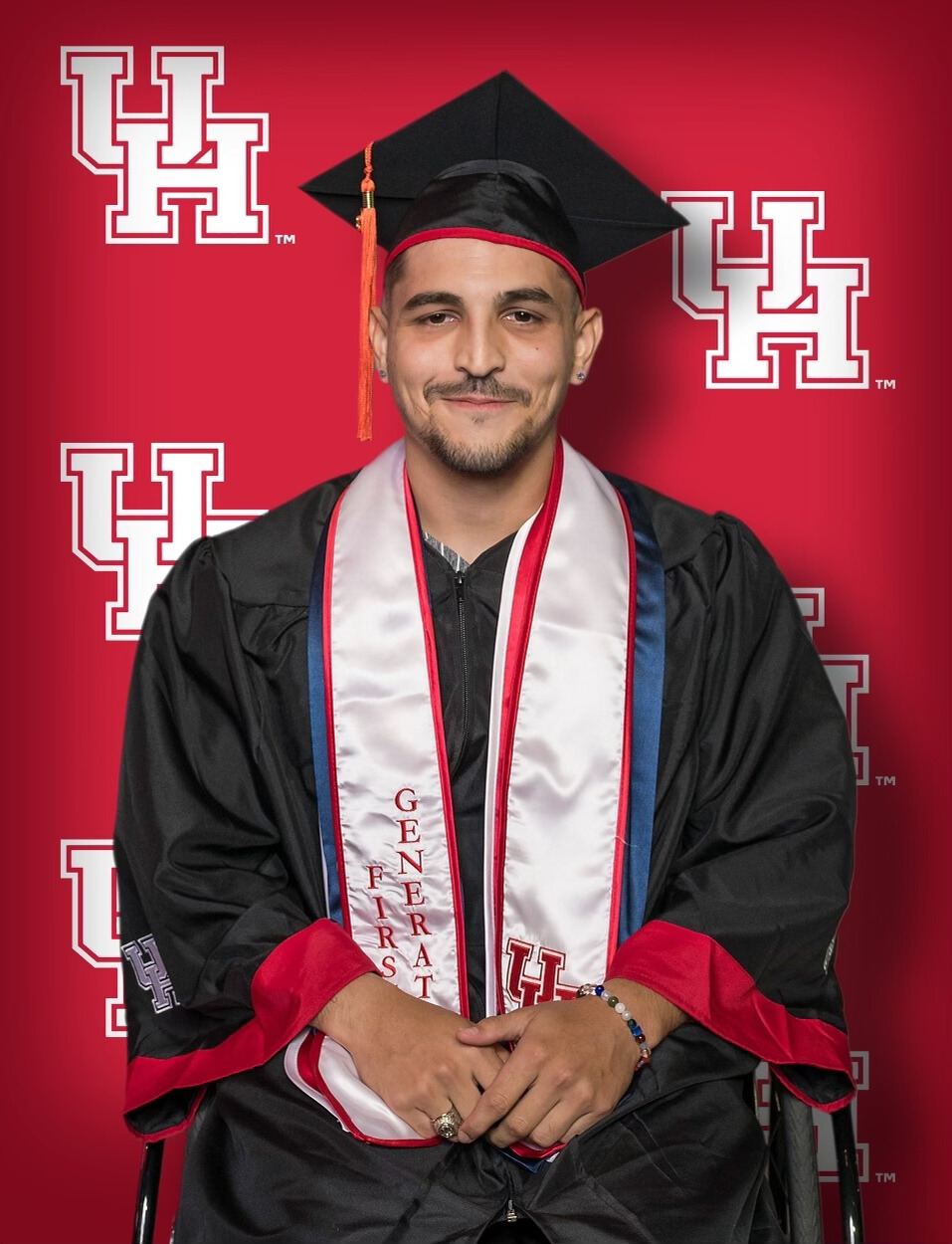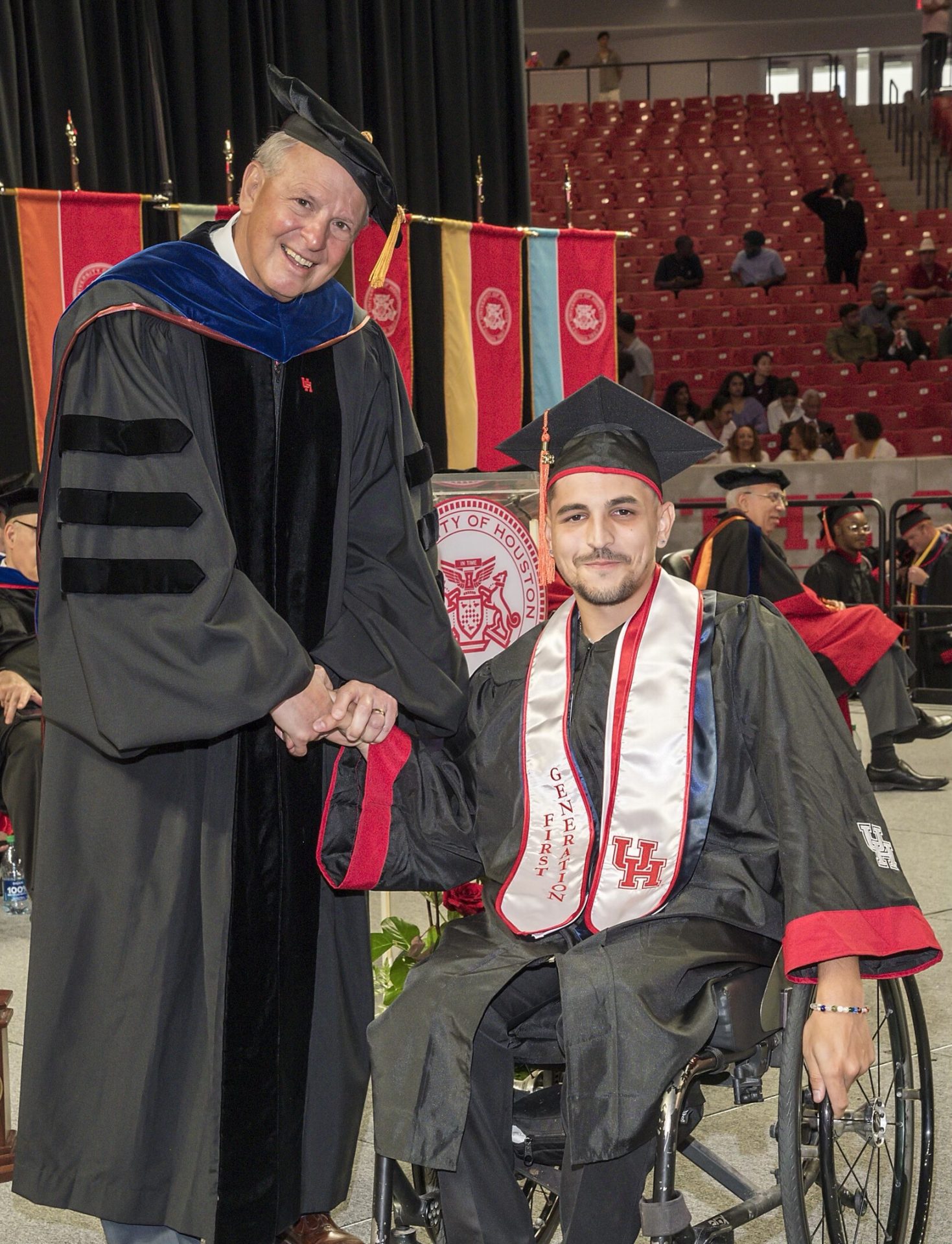|
Only have a minute? Listen instead
Getting your Trinity Audio player ready...
|
I don’t tend to limit myself just because I can’t walk. I go out, I go and do things, I attend university events. I don’t let anybody stop me, so I feel like my college experience was pretty much like everybody else’s.

With a broad smile on his face, Nicholas Tijerina threw both hands high in the air as he crossed the stage at the University of Houston’s Cullen College of Engineering commencement ceremony on May 13.
Tijerina went across the stage in his wheelchair, a constant in his life since he was hit by a stray bullet at Harwell Middle School in Edinburg 11 years ago, leaving him paralyzed from the waist down.
Despite the tragedy and the hardships that followed it, a fairly commonplace graduation emotion filled Tijerina when he officially received his bachelor’s degree in mechanical engineering: relief.
“A big weight lifted off my shoulders,” he said. “I’m the first generation for my family, a first generation for my family, so it meant a lot to my mom for me to graduate.”
If you ask Tijerina the challenges he’s faced and the roadblocks those challenges put between him and graduation, he largely brushes off the implication that he’s accomplished more than his peers.
Tijerina says he crammed for tests like everybody else. He worried about grades like everybody else. He worked with professors like everybody else.
One stubbornly inaccessible engineering building sometimes occasionally posed a problem but, Tijerina says, his undergrad years really weren’t so different.
“The college experience for me has been pretty much the same,” he said. “I don’t tend to limit myself just because I can’t walk. I go out, I go and do things, I attend university events. I don’t let anybody stop me, so I feel like my college experience was pretty much like everybody else’s.”
Reaching that point of acceptance — of not limiting himself — was, however, a difficult process.

In December of 2011 Tijerina and another Edinburg teenager, Edson Amaro, were hit by bullets fired by an unwitting target shooter almost a mile away.
The boys were practicing for basketball tryouts.
Both lived, though they suffered traumatic wounds.
Internal injuries necessitated the removal of one of Amaro’s kidneys.
Tijerina’s spinal injuries robbed him of his ability to walk.
The injuries — and the wheelchair — also branded him as something different, sometimes an object of curiosity for other kids.
Tijerina and his mother, Donna, moved to the Houston area after the shooting. Some of his new classmates didn’t believe him when Tijerina told them about the freak accident.
For the next six or seven years, Tijerina says, he dropped into a deep depression. He was shy. Quiet. Negative and withdrawn, sticking to himself and viewing himself as very much different.
“That’s what my mindset used to be,” he said.
Eventually, Tijerina got professional help. He began to try to feel better, and eventually did feel better.
It wasn’t so much that he’d had some sort of revelation that he really wasn’t so different — he was just tired of being miserable.
“The world of being in a wheelchair is definitely different, but there’s communities out there,” Tijerina said. “There’s different sports, there’s different ways for you to live your life. It’s not the end of the world just because you’re in a wheelchair. And that took some time for me to figure out.”

Sports, in particular, have helped, along with the community they foster. Tijerina started coming out of his shell in college. He’s part of an adaptive athletics wheelchair tennis program and plays wheelchair softball. Now he’s thinking about getting into adaptive sled hockey.
If there’s any vestige of depression left in Tijerina, it doesn’t show.
“Sometimes I think back and I look at it, but I don’t ever look back on it with hate or regret or agony. It’s an event that happened in my life, that … ,” Tijerina said, pausing for a moment to think. “Whenever you’re in the disabled community, you hear other people’s stories, where a freak accident happens. Like, people get in car accidents — or I know a guy where his whole team had died and he was the only one that survived. He ended up in a chair.
“Another guy, semi-pro soccer player, and he was about to go professional. He ended up in a chair. Another guy, he was gonna be an Astros pitcher, and he ended up in a chair … When you talk to people, you realize that trauma is everywhere; you can’t let it hold you back.”
Tijerina’s planning to keep pushing himself. He says he’ll pursue a masters degree in aerospace engineering now, and hopes to work somewhere like Northrop Grumman or NASA one day.
“Because my eyes have always been looking up, and I want to see to what extent humanity can go,” he said. “And I want to try and innovate and help do my part.”




